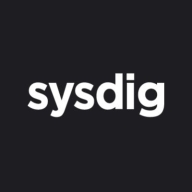


Prisma Cloud and Sysdig Secure compete in the cloud security category, focusing on enhancing cloud-native security. Prisma Cloud seems to take the lead in offering a more comprehensive suite of features across multiple cloud environments and extensive customer support, while Sysdig Secure excels in specific runtime detection capabilities, particularly in Kubernetes environments.
Features: Prisma Cloud provides features such as dynamic workload identity creation, integration with AWS through Aporeto, and automated forensics. It also offers compliance across heterogeneous environments, managed rule sets, and real-time vulnerability scanning. Sysdig Secure prioritizes runtime detection in Kubernetes, enhanced visibility, cloud-native protection, and in-depth application monitoring.
Room for Improvement: Prisma Cloud could enhance documentation with real-world use cases and improve dashboard customization. Users also suggest a better API security focus and smoother integration among its features. Sysdig Secure needs improved dashboarding, better alerting systems, and more customization options. Scalability enhancements and longer configuration capabilities for live dashboards were also highlighted.
Ease of Deployment and Customer Service: Prisma Cloud provides flexible deployment across public, private, and hybrid clouds and has responsive customer support, though variability exists by region. Sysdig Secure offers efficient deployment in on-premises and public clouds with positive feedback on its supportive customer service and problem resolution.
Pricing and ROI: Prisma Cloud is noted for high costs but offers comprehensive capabilities, appreciated for its ROI in visibility and security posture enhancement, though quantification is challenging. Sysdig Secure offers reasonably priced straightforward licensing with recognized ROI in security posture improvement and acknowledged value for money.
| Product | Market Share (%) |
|---|---|
| Prisma Cloud by Palo Alto Networks | 12.9% |
| SentinelOne Singularity Cloud Security | 5.7% |
| Sysdig Secure | 3.3% |
| Other | 78.1% |
| Company Size | Count |
|---|---|
| Small Business | 48 |
| Midsize Enterprise | 22 |
| Large Enterprise | 54 |
| Company Size | Count |
|---|---|
| Small Business | 36 |
| Midsize Enterprise | 22 |
| Large Enterprise | 56 |
| Company Size | Count |
|---|---|
| Small Business | 6 |
| Midsize Enterprise | 2 |
| Large Enterprise | 5 |
SentinelOne Singularity Cloud Security offers a streamlined approach to cloud security with intuitive operation and strong integration capabilities for heightened threat detection and remediation efficiency.
Singularity Cloud Security stands out for its real-time detection and response, effectively minimizing detection and remediation timelines. Its automated remediation integrates smoothly with third-party tools enhancing operational efficiency. The comprehensive console ensures visibility and support for forensic investigations. Seamless platform integration and robust support for innovation are notable advantages. Areas for development include improved search functionality, affordability, better firewall capabilities for remote users, stable agents, comprehensive reporting, and efficient third-party integrations. Clarity in the interface, responsive support, and real-time alerting need enhancement, with a call for more automation and customization. Better scalability and cost-effective integration without compromising capabilities are desired.
What are SentinelOne Singularity Cloud Security's standout features?SentinelOne Singularity Cloud Security is deployed in industries needing robust cloud security posture management, endpoint protection, and threat hunting. Utilized frequently across AWS and Azure, it assists in monitoring, threat detection, and maintaining compliance in diverse environments while providing real-time alerts and recommendations for proactive threat management.
Prisma Cloud by Palo Alto Networks provides comprehensive cloud-native security solutions. It covers dynamic workload identity, automated forensics, and multi-cloud protection, ensuring robust security across diverse cloud platforms.
Prisma Cloud delivers advanced capabilities for managing cloud security across AWS, Azure, and GCP platforms. It offers dynamic workload identity creation, real-time monitoring, and seamless integration into CI/CD pipelines. With automation, centralized dashboards, and enhanced visibility, users effectively manage security misconfigurations and vulnerabilities. While optimizing cloud environments through runtime protection and compliance, Prisma Cloud faces challenges with its navigation, pricing, and limited automation capabilities. Users seek improvements in API security, role-based access controls, and documentation quality, emphasizing the need for enhanced customization and reporting features.
What are the important features of Prisma Cloud?
What benefits or ROI should users consider in reviews?
Industries like finance and telecom rely on Prisma Cloud for managing cloud security posture and container security. Teams utilize its capabilities across hybrid and multi-cloud settings to ensure compliance and robust threat protection. Features like misconfiguration detection and runtime monitoring are critical in promoting security objectives in these sectors.
In the cloud, every second counts. Attacks move at warp speed, and security teams must protect the business without slowing it down. Sysdig stops cloud attacks in real time, instantly detecting changes in risk with runtime insights, a unique AI architecture, and open source Falco. Sysdig delivers live visibility by correlating signals across cloud workloads, identities, and services to uncover hidden attack paths. By knowing what is running, teams can prioritize the vulnerabilities, misconfigurations, permissions, and threats that matter most. From prevention to defense, Sysdig helps enterprises move faster and focus on what matters: innovation.
Sysdig. Secure Every Second.
We monitor all Cloud-Native Application Protection Platforms (CNAPP) reviews to prevent fraudulent reviews and keep review quality high. We do not post reviews by company employees or direct competitors. We validate each review for authenticity via cross-reference with LinkedIn, and personal follow-up with the reviewer when necessary.